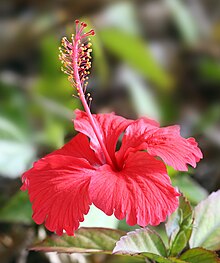| Hibiscus | |
|---|---|

| |
| Hibiscus × rosa-sinensis | |
| Scientific classification | |
| Kingdom: | Plantae |
| Clade: | Tracheophytes |
| Clade: | Angiosperms |
| Clade: | Eudicots |
| Clade: | Rosids |
| Order: | Malvales |
| Family: | Malvaceae |
| Subfamily: | Malvoideae |
| Tribe: | Hibisceae |
| Genus: | Hibiscus L. |
| Species | |
| Synonyms[1] | |
| |
Hibiscus[2][3] is a genus of flowering plants in the mallow family, Malvaceae. The genus is quite large, comprising several hundred species that are native to warm temperate, subtropical and tropical regions throughout the world. Member species are renowned for their large, showy flowers and those species are commonly known simply as "hibiscus", or less widely known as rose mallow.
The genus includes both annual and perennial herbaceous plants, as well as woody shrubs and small trees. The generic name is derived from the Greek name ἰβίσκος (ibískos) which Pedanius Dioscorides gave to Althaea officinalis (c. 40–90 AD).[4][5]
Several species are widely cultivated as ornamental plants, notably Hibiscus syriacus and Hibiscus × rosa-sinensis.[6]
A tea made from the flowers of Hibiscus sabdariffa is known by many names around the world and is served both hot and cold. The beverage is known for its red colour, tart flavour, and vitamin C content.
- ^ Hibiscus L. Plants of the World Online. Retrieved 19 June 2023.
- ^ Oxford English Dictionary
- ^ Sunset Western Garden Book, 1995:606–607
- ^ Lawton, Barbara Perry (2004). Hibiscus: Hardy and Tropical Plants for the Garden. Timber Press. p. 36. ISBN 978-0-88192-6545.
- ^ Henry George Liddell, Robert Scott, A Greek-English Lexicon, ἰβίσκος
- ^ Brickell, Christopher, ed. (2008). The Royal Horticultural Society A-Z Encyclopedia of Garden Plants. United Kingdom: Dorling Kindersley. p. 534. ISBN 9781405332965.